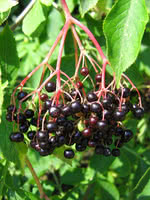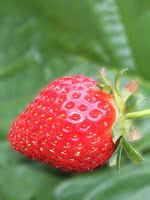Mon-Fri 9am - 5pm Mountain time
Black Elderberry vs Albion Strawberry
Sambucus canadensis
Fragaria ananassa Albion
NOT AVAILABLE THIS SEASON - MIGHT RETURN
Black Elderberry is a deciduous shrub native to eastern North America. You can plant this shrub in moist areas and it will help stabilize your soil. You can also use it on rural properties anywhere you'd use a lilac.
Black Elderberries are considered to be partially self-pollinating. So while they will still produce some berries without cross-pollination, planting with another variety will increase yields. Consider planting with Ranch Elderberry or Bob Gordon Elderberry.
Warning: the seeds, stems, leaves, roots, and uncooked berries of the Black Elderberry are poisonous to humans when eaten in quantity. You should cook the berries to make them safe for human consumption.
Albion Strawberry is an Day Neutral (Long Day, Everbearing) hybrid that produces berries all summer and into fall. It is heat tolerant and disease resistant, and grows well in warmer climates. Its conical fruit, bright red color, and reliable firmness, make the fruit excellent for fresh eating, or in pies or jellies.
Black Elderberry Quick Facts
Albion Strawberry Quick Facts
Toxicity: leaves, stems, and uncooked berries are poisonous to humans

